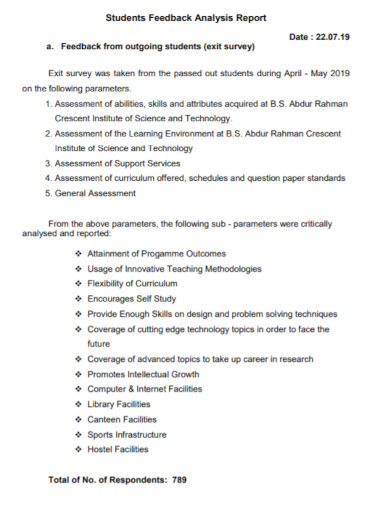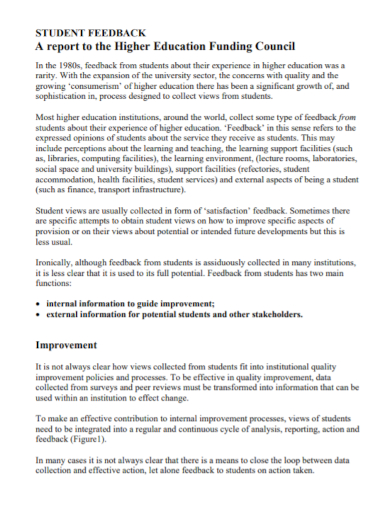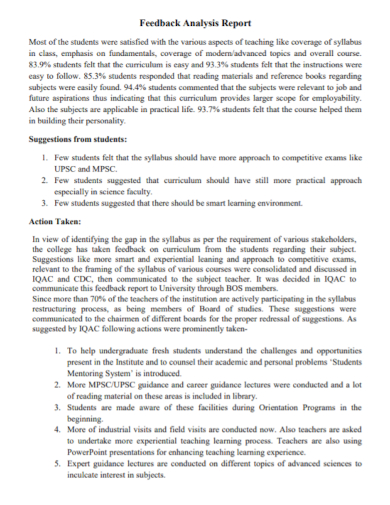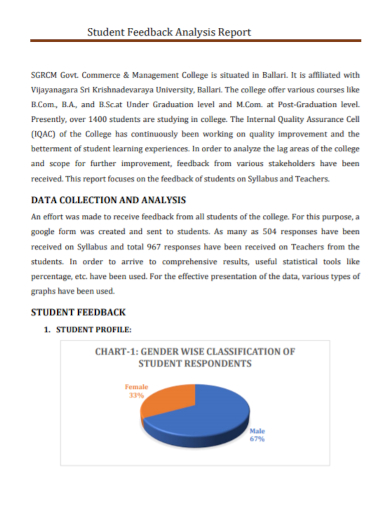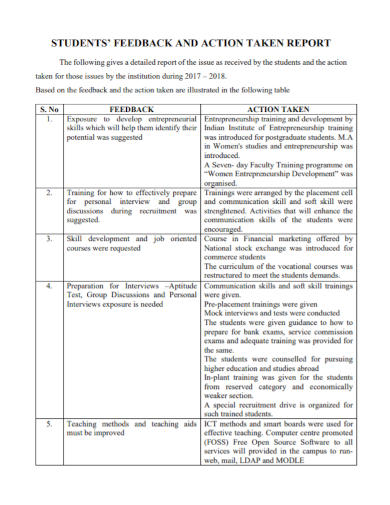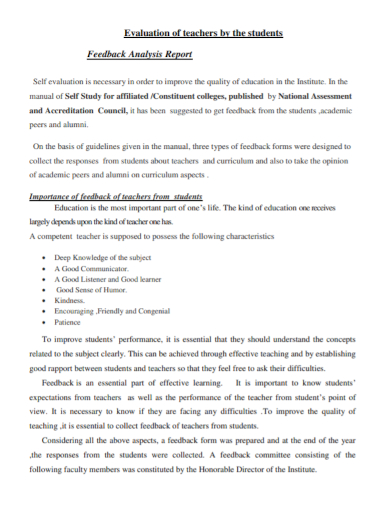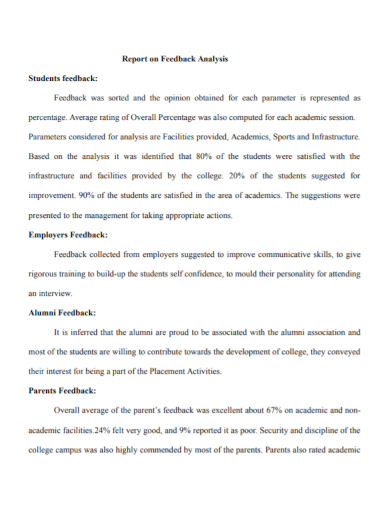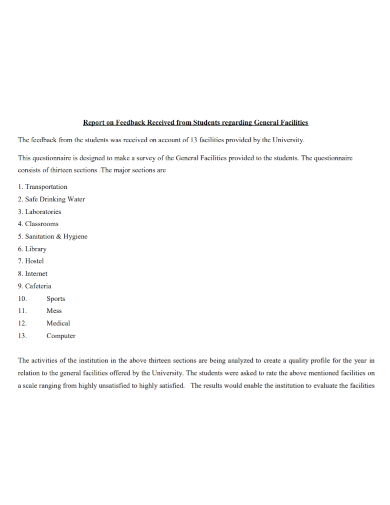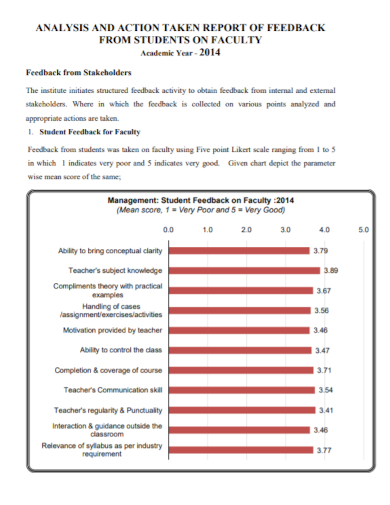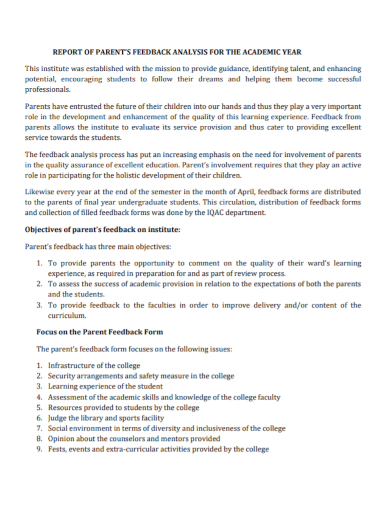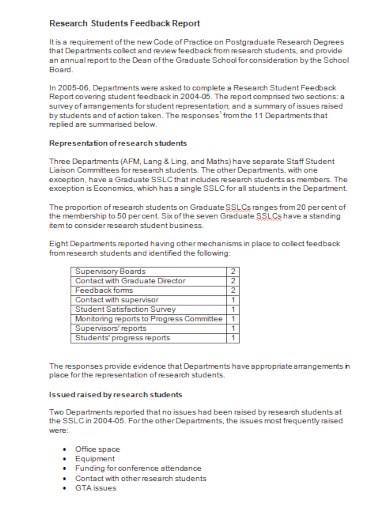Giving feedback to student’s performance in their academics is important for them to know what areas they need to improve and what areas they are good at that they can further develop it. Giving feedback reports can be quite a challenge since your report varies from one student to another. Fortunately, there are many ways on how to deliver a feedback report to your students. This article will guide you on how to make a feedback report for students with some sample templates that you can refer to once you make your report.
10+ Feedback Report for Students Samples
1. Students Feedback Analysis Report
2. Students Higher Education Feedback Report
3. Students Feedback Analysis Action Taken Report
4. Students Feedback Data Analysis Report
5. Students Feedback Action Taken Report
6. Students Evaluation Feedback Report
7. Students Employers Feedback Report
8. Feedback Report for Students Facilities
9. Feedback Report for Students Faculty
10. Parents Feedback Analysis Report for Students
11. Students Research Feedback Report
What is a Student Feedback?
When teachers give feedback to students, they should give a detailed and accurate explanation of what the student is doing right and wrong. A student can improve on his studies greatly if he is informed on the areas he excels in and in the areas he needs more work to do.
Feedback should help the student improve their learning skills instead of crushing their spirits and discourage them from learning teaches only provide harsh criticisms. Each student has unique skills so teachers should highlight positive feedback by pointing out the student’s strong skills and gently point out the areas for improvement. Encouraging them to keep up their good work and guiding them on improving their performance need should be balanced.
How to Make a Student Feedback Report
Here are some following tips on giving feedback to students:
Ask Yourself Some Questions to Help You Write Your Feedback
To help you write your student’s feedback, you need to ask yourself the following questions: What can the student do? What can’t the student do? How is the student’s performance compare with his peers? How can the student do to improve his work? This will aid you in getting straight to the point.
Use Rubrics to Measure Knowledge
One way to measure a student’s progress in learning is by having rubrics for reference. The rubrics can measure on what level is the student’s learning skills have developed. Use your rubrics as the basis for you to highlight the strong and weak areas of the student.
Record Your Tracking of Your Students’ Performance
Use a record book or a journal or a notebook to keep your progress tracking of your students. Make daily or weekly comments on their work improvements, such as test and project activity scores, their behavior, and even the questions they ask in class. This will be useful to serve as a reference to discuss your feedback comprehensively with your students and their parents.
Highlight Positive Feedback by Giving Praise
Make your praises personal and specific. By only saying “good job” or “nice work”, it doesn’t mean much to students but unless you personally praise them for being the best in math class or having the highest score on the history test, the students will appreciate your praises more and will make them feel better and encourage themselves to maintain their good work. Your feedback should be based on positivity, so you need to highlight praises for the student.
Let Your Student Understand the Purpose of Having a Feedback Report
Make your student understand that the purpose of feedback. Communicate with them that it is done for their own improvement, Show students how they can improve in their schoolwork such as providing examples on what a project with an A grade is. Point out the components of the project that made it earn an A. That way, the students have some reference on how to improve their work.
FAQs
What are the three types of feedback?
The three types of feedback consist of appreciation, coaching, and evaluation.
How do you comment on a student’s performance?
Teachers can base their comments on their students through their attitude, behavior, character, communication skills, talents, participation, time management, and work habits.
How do you praise students?
Praise students by noticing your students’ efforts. Speak to them in a genuine enthusiastic approach. Most importantly, do not include criticism when you’re giving out your praise.
Don’t forget to provide feedback to your students regularly. This will help keep them in check with their progress and will strive to improve more in their schoolwork. When providing feedback, have a one-on-one meeting with each student for each of you to focus on the feedback. Make sure to ease the tension from your students to avoid anxiety on their part. To get started on writing a feedback report for students, you can refer to the sample templates above. They are also free so start downloading now.
Related Posts
FREE 9+ Sample Presentation Evaluation Forms
FREE 9+ Tutor Report Form Samples
FREE 9+ Sample Project Evaluation Forms
FREE 8+ Teacher Evaluation Forms
FREE 8+ Sample Teacher Self-Evaluation Forms
FREE 7+ Sample 360-Degree Feedback Forms
FREE 6+ Sample Group Activity Evaluation
FREE 6+ Class Evaluation Samples
FREE 6+ Sample Teacher Evaluation Forms
FREE 11+ Teaching Evaluation Form Samples
FREE 10+ Sample Presentation Feedback Forms
FREE 9+ Sample Teaching Evaluation Forms
FREE 8+ Course Evaluation Forms Samples
FREE 9+ Medical Evaluation Form Samples
FREE 9+ Sample Presentation Evaluation Forms

